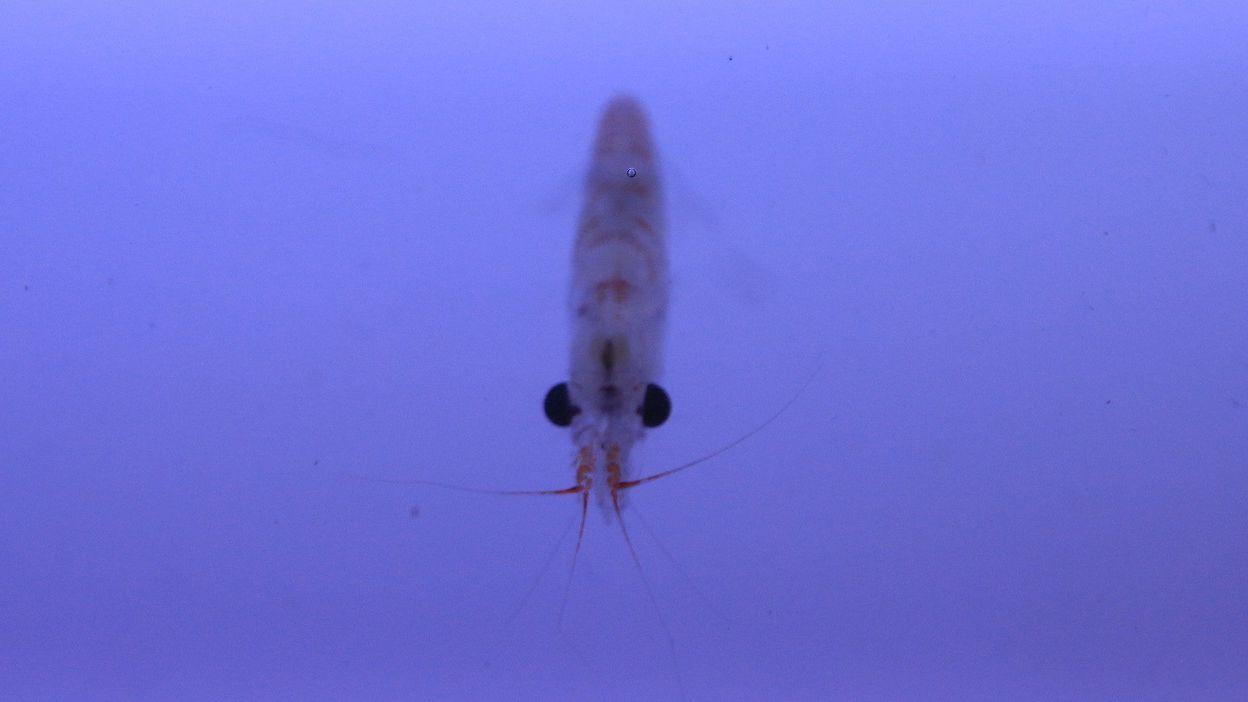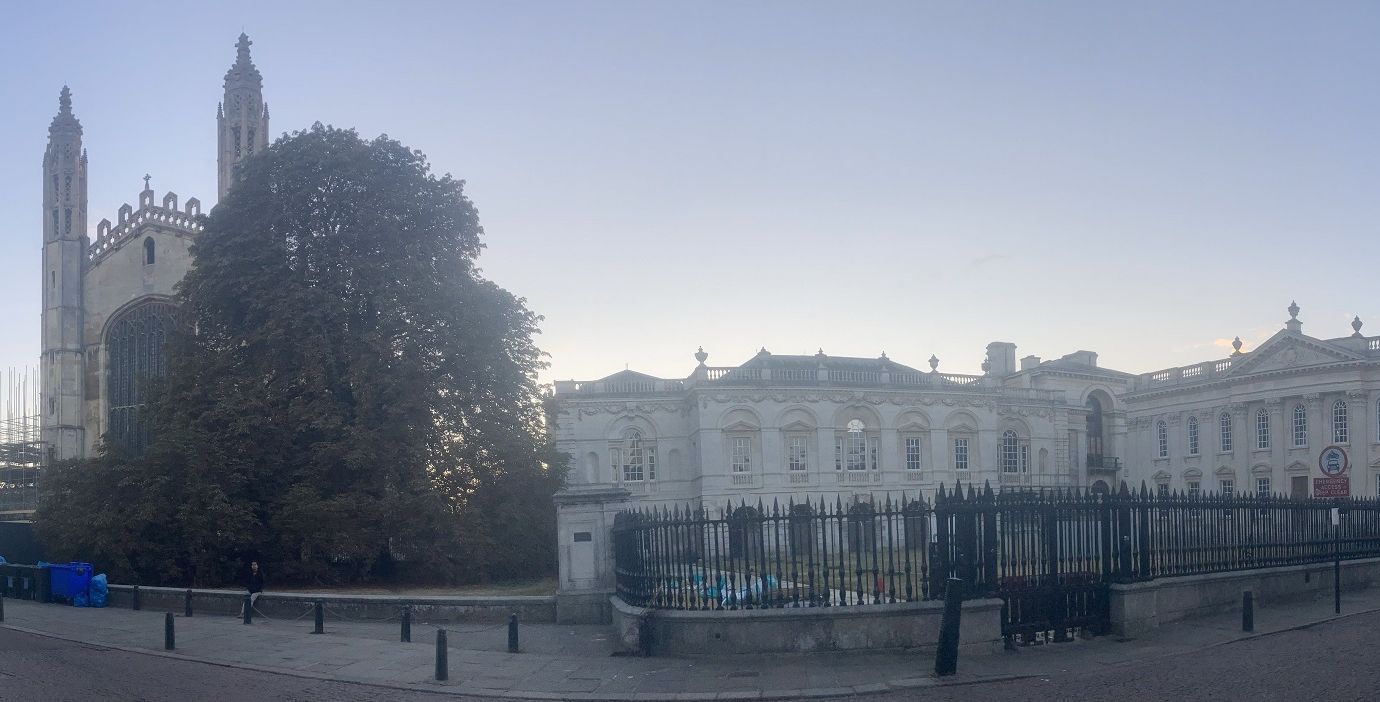Dominik Bahlburg
 Privat
Privat
Dominik Bahlburg spent two months conducting research at the British Antarctic Survey
"My research stay at the British Antarctic Survey in Cambridge was an amazing opportunity for getting to know a new institute and its research culture, and has been an immense source of enrichment for my current doctoral project and future endeavours."
Thanks to the Prof. Bingel Scholarship, Dominik Bahlburg was able to spend two months researching at the British Antarctic Survey in Cambridge and significantly advance his dissertation. In the following, he reports on his research project and everyday working life:
In the context of my doctorate about the ecology and modelling of Antarctic krill at the Dresden University of Technology and thanks to the scholarship granted to me by the DAAD-Stiftung with funding from the Prof. Dr. Bingel-Stiftung, I was able to perform a two-month research stay at the British Antarctic Survey in Cambridge.
I have been fascinated by the polar regions for a long time, not only because of their remoteness and relatively unspoiled state, but also because of their significance to our global climate. At the same time, they are regions undergoing a transformation. While Antarctica continues to enjoy international protection, there has been an increase in human activity such as cruises and commercial krill fishery. Meanwhile, populations of large krill predators such as fin and humpback whales have thankfully been recovering from their depletion through whaling. Combined with climate change and commercial fishery, this recovery is putting increasing pressure on the krill population. Antarctic krill is a keystone species of the Antarctic Ocean, and a large number of marine species (almost all penguin and seal species, as well as baleen whales, fish, sea birds and squid) depend on krill as a source of nutrition either directly or indirectly. At the same time, Antarctic krill is likely the world’s wild species that accounts for the greatest amount of biomass, making it a vital component of the carbon cycle, as it binds carbon in the form of biomass and exports large amounts of carbon as faeces. This is why significant changes to the krill population have a wide range of consequences, making Antarctic krill an important and fascinating object of study in the field of tension between politics, economics and ecology. The goal of my doctoral project is to develop and improve simulation models that allow for an analysis of the current and future impact of different stress factors on krill (climate change, fishery, predation). The British Antarctic Survey is an institute with a long history in krill and polar research and is considered an international flagship in these fields. Learning from and with leading experts on-site was therefore an amazing opportunity for me.

Privat
Antarctic krill
My stay has been of great value for my doctoral project, since my two scientific hosts Dr Sally Thorpe and Professor Dr Eugene Murphy have been involved in my research project as cooperation partners from the start. Following three years of virtual meetings, my stay enabled us to address and discuss shared research questions in the area of individual-based and ocean modelling far more directly and efficiently. This put us in a position to work on two chapters of my doctoral thesis and to make great progress in a very short time.
On the one hand, we worked on a comprehensive comparison of existing growth models for Antarctic krill that produced many new and important insights for developing more robust models in the future and for making predictions more precise. On the other hand, we focussed on seasonal behaviour data of krill to gain a better understanding of the degree of adaptivity of the crustaceans’ behaviour across seasonal and regional scales. These findings are vital to allowing a better understanding of the regional distribution of krill populations.

Privat
Cambridge
The British Antarctic Survey is affiliated to the University of Cambridge, which is why I was able to use the university’s own portal to look for accommodation. This was a rather smooth process, and I was able to find a relatively affordable furnished room in Cambridge for 550 GBP per month. My accommodation was located in Coton on the edge of the city, in the beautiful house of my lovely host Mandy, and I could not have wished for more. I was able to cycle to the institute in 5 minutes and to Cambridge city centre in 10 minutes.
The British Antarctic Survey is a lively institute with a very pleasant working atmosphere and plenty of dialog among the different working groups. The time of my stay had been chosen deliberately to ensure that most researchers would be on-site, since a large share of the staff members are pursuing fieldwork in the Arctic and Antarctica between December and April in particular. I was therefore able to get in touch with many scientists, to attend seminars, have discussions over lunch and also to enjoy a range of activities with the other doctoral candidates in my free time. All of these aspects were highly beneficial during my time in Cambridge, and I am certain that the contacts I established will also be great assets in future. New joint projects arose immediately after my stay, and the discussions among us young researchers have intensified, which I find very valuable.
On a typical working day, I would arrive at the institute in the morning, where I shared an office with Thibault, another guest researcher. Luckily we got on well from the start, so the working atmosphere in our office was always communicational and friendly. Owing to the fact that polar research is a very international discipline, English is often my everyday language, also in Germany. This is why I was lucky enough to not have any trouble adapting to the language. For lunch we would go to the institute’s in-house canteen together with the other researchers. It goes without saying that fish and chips was available on a regular basis, but the menu was very diverse with a large salad bar to which I paid frequent visits. The cashier saying “that's £4.50, darling” made visiting the canteen even more enjoyable. Over lunch we usually discussed our plans for the night, the weekend or the weekly tradition of eating cake on Thursday afternoons. In the afternoon, I often met up with Sally and Eugene to discuss the progress of our work. These meetings were characterised by open exchange among equals. I was used to this from earlier online meetings, but it is something I greatly appreciate. In the evenings I would go bouldering with Thibault, go to a pub with him and other people from the BAS, explore the area by bike or have conversations with my landlady Mandy over dinner. Another highlight during my time in Cambridge was a ride on a typical local punt boat that a colleague was able to organise for us through his college.
Cambridge is a very interesting and beautiful city on the whole, where the venerability of its famous university can be felt in every nook and cranny. This pathos does occasionally take the form of a certain degree of elitism, expensive restaurants and high rents, but my stay was a wonderful experience, nevertheless. The impressive architecture and academic history of the different colleges that are spread across the entire city, the freely accessible museums and student culture allow for many exciting opportunities (and so does the diverse range of pub quizzes that are organised by local pubs on a regular basis).
My time at the British Antarctic Survey was a great source of enrichment for me, both personally and professionally. I would therefore like to thank the DAAD-Stiftung for the financial support and promotion of my stay through the Professor Bingel Scholarship. During my stay I was able to achieve great academic progress in just a short time, establish many personal and professional contacts, get to know a new institute and research culture and learn from many experienced academics.
As of July 2023. The German version is the original.


